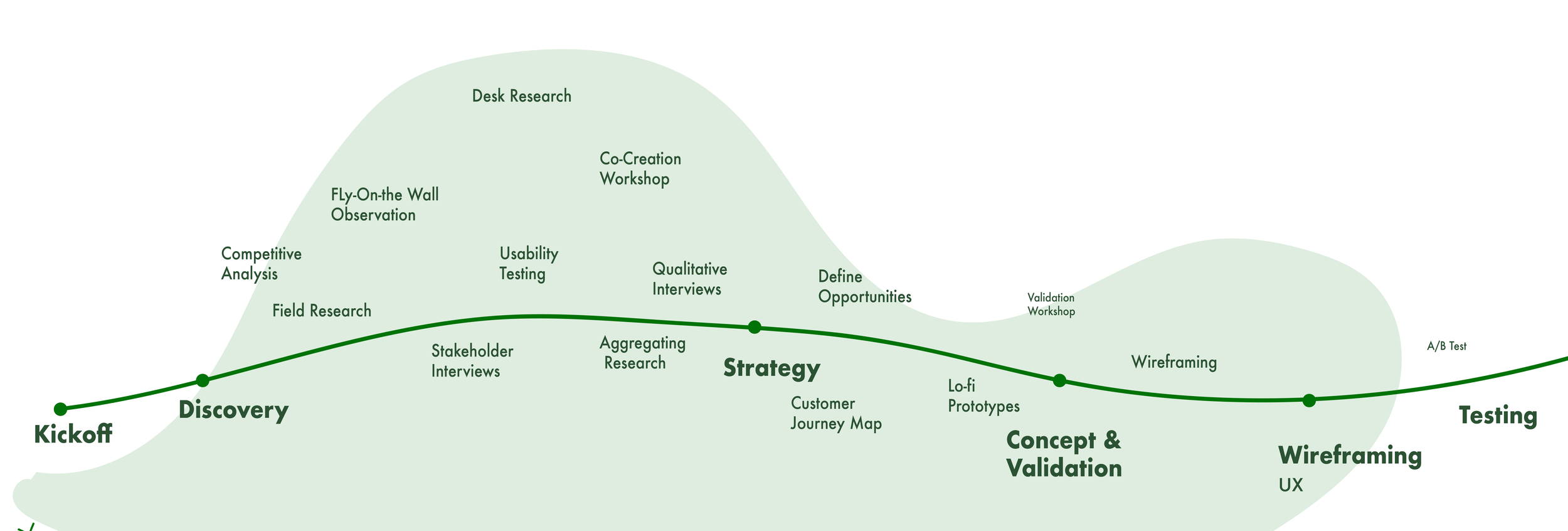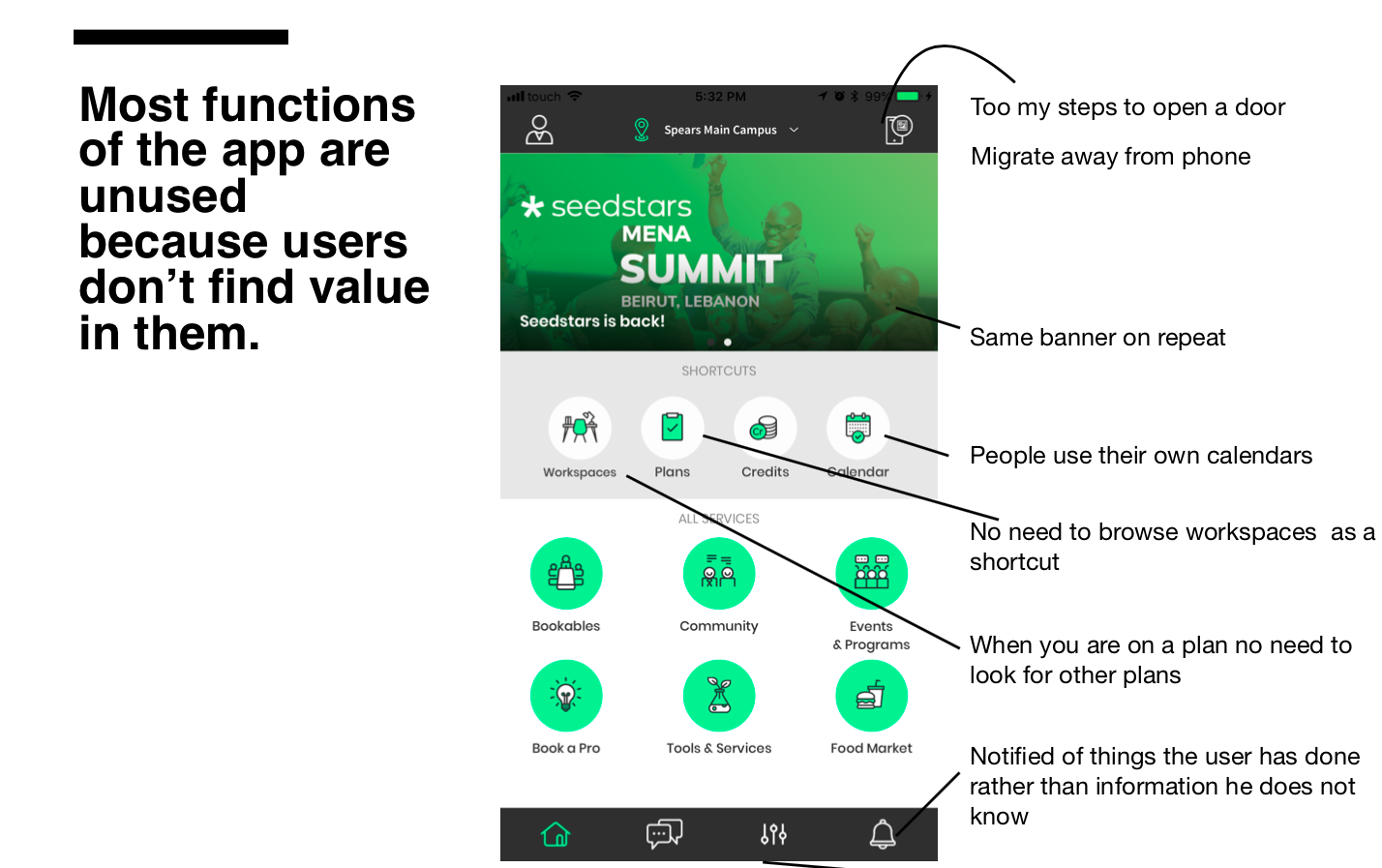Client | Strategic Service Design
Antwork
Increasing engagement through digital and physical touchpoints : How do we innovate in shared co-working space?
About Antwork
Antwork is a technology company powering co-working spaces in Europe & the Middle East. It provides private offices & shared spaces within a global Antwork community.
Need
Antwork needed to develop a better user experience for the mobile app. They also needed to identify new areas of opportunity to gain new clients, expand beyond the Middle East, and find solutions to the other services they provide.
Problem
Upon stakeholder research, user research, and journey mapping we identified a problem with the consumption of the service and found opportunities to increase revenue and engagement.
Solution
We designed a “Marketplace” that came as an addition to structured plans of subscriber and space owner. This plan allowed for enhanced autonomy and belonging to the space.
Research
Phase 1 Stakeholder Research
What are their long term and short term business objectives ?
What is their business model, value proposition, main revenue channels, and potential opportunities they have identified?
Which target groups bring them the most revenue?
Which areas have identified that need to be improved?
Stakeholder Insights
Intimidation is a barrier
To outsiders, the Coworking space is intimidating and ‘elitist’ and people are not used to it. The concept of a cowering space is still relatively new, it is unclear to customers the value of being in a shared space, most resort to cheaper alternatives such as coffee shops and libraries.
Real Estate Expansion
After conducting several one-on-one interviews we understood that they needed to design the perfect seamless platform. Their goal was not just to increasing their customer base but also being able to scale this technology to other co-working spaces, empty residential buildings, and finally go international.
Main Competitors
Main competitors are not other co-working spaces With not too many Their main competitors ncrease the people that are subscribing to the space, understanding how they can rival their competitors who are mostly coffee shops, and become a technology driven company that powers unused spaces and tap into the real estate market.
App as secondary usage
Most of the magic still happens in the back-end but the users only use it to open doors. Customers needed to rely on this interaction and make it indispensable.
Main revenue is from office space.
That is why they see that we need to strengthen the subscriber base since there are limited offices but ample space for shared spaces.
Phase 2 - Discovery
This phase contains several research tools and methods to get to the assimilated insight.
Evaluation & Usability Test
The next step was to observe and record user insight from the interaction with the current state of the app. I asked 15 people with different relationships to Antwork to describe their pains and gains of interacting with the user interface. This opened up research areas into their behaviors in the physical space.
Learnings from Usability Test
There is a general unanimous frustration in the interaction with the current app. This includes not only issues of responsiveness, but clutter, inability to find what is needed in the right time, ineffective information, controls that are are personalized, inability to comprehend the credit based system, and customers even said they barely used it as they see no benefit other than opening doors.
2. UX Scope / Identifying Pain Points
The usability test gave insight into which areas we should be further researching and innovating in. While at surface level it seemed that there were in fact redundancies and elements that weren’t fit for all users to see. The main learning was opening up these different sections for further behavioral research.
User Research
Identified target audience
The target audience is defined under the payment plan they belong to. These are the consumers that Antwork is looking to target.

Qualitative Research
The guided interviews served to validate and or inform of behaviors and needs in all the affected UX scope areas. This also meant that we needed to include questions to meet the stakeholder objectives for their customers. The questions encompassed Plans, Bookings, Service Exchange, Services, Purchases, Credit Payments, Community, Calendar,
Main Insights from residents / office owners
Main Insights from Subscribers
Subscribers definitely have more chance to integrate with the community, we on the other hand feel mentally locked in our space even if it is a shared space.
Working within an office here gives you even less privileges than being a subscriber. You don’t have your own account and most permissions have to go through a higher executive power of the company.
Interacting with the wallet, the atmosphere controls are all part of a non-owned plan. We basically have no use for the app except opening the door.
Subscribers value connections in the co-working space and facilitation of that that is their main driver of becoming a part of the network however they do not find that at the moment.
Subscribers are unanimously asking for more transparency and visibility and decision making in how and when they spend what they are paying for.
Subscribers want to integrate their external apps with the app, their personal calendar, their meeting room schedule and make that equally easily shareable.
Subscribers want more flexibility and mobility and want to be part of brand partnership initiatives.
Persona Cards
Marketplace as a solution
What the suggested solution addresses
Barrier of Entry
The model of a Coworking space is a great example of the shared economy. Having people work alongside each other, share, collaborate, learn and thrive in a unified space is a pillar towards better meshed multidisciplinary work. However if you are on the outside of this evolving phenomenon the entry point can seem intimidating. Being used to older models of work, this alternative appears expensive to freelancers and tough for office owners to truly harness this collaborative atmosphere.
Flexibility
Aside from the barrier of entry, when on the inside there is an impediment of flexibility with how you utilize these shared spaces. Through my research I came to understand that the main problem in co-working spaces is a frustration with ownership. Being a part of this movement in a shared space meant in a way giving over autonomy to dictated plans and so the hindering the feeling of belonging and loyalty.
Making Informed Choices
While it took rigorous research to understand people’s feeling with the space, it was only the starting point. I had to translate needs, behaviors, and emotions so that it made business sense. Through iterations and testing I was able to prototype a different service to show how when given autonomy people can track and make choices and purchases for themselves in the space. This loyalty opens up the commitment of using solely their services without resorting to the outside. This model is scalable into their future locations and also breaks down the barrier of entry.
Phase 3 - Business Strategy
Objectives
After assessing the project scope it was clear that the business offering had to be redesigned and only then the app would follow.
Design + Business Strategy
Antworkers feel like they the fixed plans are not being utilized properly because of their different needs, for that reason we created the marketplace.
Mapping Service Touchpoints
Phase 5 - Design Solution
Service Design Strategy
Redesign into an on-demand marketplace with single purchases.
Residents, Subscribers (Hot deskers), walk-ins, can all access the marketplace for all services. Meeting Rooms, Access Passes, Services from other member in the community, food and beverage, printing, internet services, lockers, just about anything is now on the marketplace. Rather than getting pre-fixed plans by Antwork, you can build your own plan and see the progression of it.
Phase 6 - Implement
Marketplace
The new marketplace gives autonomy through building customizable plans
Subscriptions clearly show what needs to be replenished. In old plans some services were remaining untouched which drove people away from committing to plans.
Customizable Plans
Wallet
The front balance shows everything from meeting room hours to access days, something that was not there before.
Top Up and records are directly on the tab of the selected purchase
The Marketplace
The front page of the marketplace lets you browse through diverse offerings form events to booking a meeting room.
Statistics.
The interaction with the co-working space can give insight into spending habits, arrival time and average time spent in meetings.
Space Control
Another added feature is allowing residents and hot desires to access their space controls in their office and have and give access to them for everyone.
Future Recommendations
The business model is now being tested, and the implementation of this suggested wireframe is being discussed.


![Untitled-3 [Recovered]-04.png](https://images.squarespace-cdn.com/content/v1/5e697b7957e228142b881b36/1603076572397-T30M6JNK01OGN8NQNPKE/Untitled-3+%5BRecovered%5D-04.png)




















![Untitled-3 [Recovered]-02.png](https://images.squarespace-cdn.com/content/v1/5e697b7957e228142b881b36/1603077320188-BQPZXOCUNXE18LROGY98/Untitled-3+%5BRecovered%5D-02.png)














![Untitled-3 [Recovered]-05.png](https://images.squarespace-cdn.com/content/v1/5e697b7957e228142b881b36/1603077378383-MVCXRZGDLEETRLPC7IPV/Untitled-3+%5BRecovered%5D-05.png)